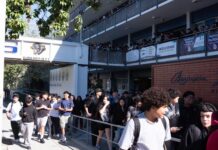A new trade agreement between the People’s Republic of China (PRC) and Taiwan negotiated last summer would further
integrate the two countries’ economies, allowing for greater direct investment in
services. Not yet ratified, the agreement has spawned a large protest movement in Taipei numbering in the hundreds of thousands. Students have occupied the
legislature for the past two and a half weeks, halting the passage of the agreement. Taiwan should ratify the trade agreement, along with legislation ensuring public and judicial oversight of future agreements with China.
The agreement will benefit each nation by removing barriers to services. The healthcare, banking and e-commerce industries would have greater room to expand as limitations on direct investment in service industries would be eliminated.The protesters are wrong to dismiss these steps toward liberal economic relations, but the embattled Taiwanese President Ma Ying-jeou must acknowledge the fears that motivate the demonstrations.
Economically, the two countries are growing ever more integrated, with bilateral trade calculated to be at $169 billion in 2012. A little over a decade ago the two nations hardly traded at all. Cooperation between Beijing and Taipei has been broadly welcomed across the world as a sign of cooling relations, despite both sides claiming rights to the other’s territory since the 1940s. Yet the increasing ties between Taiwan and the mainland belies the vast gulf that separates the two nations.
Trade between the two countries is balanced in Taiwan’s favor: In 2012, its surplus was over $95 billion, and a great deal of this is owed to Ma. Following eight years of semi-antagonistic non-engagement with the mainland under the Democratic Progressive Party (DPP), Ma was elected in 2008 promising better relations with Beijing. In 2010, Ma negotiated the Economic Cooperation Framework Agreement, which established economic favored nation status between China and Taiwan. The result has been a surge in export-led growth in Taiwan, along with a tenfold increase in inter-China tourism.
On the surface, the protest movement may seem like standard populist protectionism – an illiberal attack on globalization. Indeed, many of the protesters oppose the deal on the grounds that it will hurt native firms or even flood the service sector with cheaper mainland labor.
However, there is more substance to the movement than is casually observable. The protesters in Taiwan fear not simply economic insecurity but political absorption and national nullification.
The Taiwanese are right to view China with suspicion. It is quite clear what motivates Beijing: the Communist Party of China (CCP) believes that the interweaving of the two economies and upsurge in personal connections between Chinese and Taiwanese will ultimately shift public opinion in Taiwan in favor of unification. The CCP hopes to recreate a Hong Kong-style absorption.
Taiwan would be wise to study the former British holding, now 17 years into reunification with mainland China. The 1997 agreement handed the city over to the PRC and declared a principle of “one country, two systems,” in which Hong Kong would retain some degree of autonomy but accept Beijing’s political system (i.e. the Communist Party). However, many people in Hong Kong still view Beijing with distrust. In 2012, the people of Hong Kong were not able to vote for their city’s executive due to a special election staged by Beijing.
But the trade agreement, which protesters fear, would do nothing of this kind. It would be another step toward liberalization and a step back from confrontation.
Despite the worries of the protesters, the two Chinas must remain close, and ultimately economic integration could be a good thing. When Ma leaves power in 2016, Taiwan should not reverse on economic engagement with China but instead should continue taking steps, albeit in a more public and less autocratic style than under Ma. When they get assurance that future treaty discussions will take place publicly and maintain Taiwan’s independence and democratic system, protesters should accept the economic consequences of free trade and go home.
Will Stupp is a sophomore theater major. He can be reached at stupp@oxy.edu on on Twitter @WklyWStupp.
![]()





























